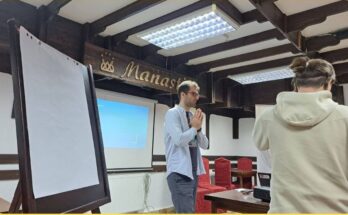| – The Schengen Agreement represents a pillar of the European project but it is still today fragile with Member States constantly violating it. – During the pandemic we have dramatically learnt, once more, that the lack of coordination causes harm to all citizens. Global challenges require supranational political answers and tools. – The Conference on the Future of Europe needs to be the opportunity to relaunch the European project with a new constituent path. |
“The Schengen Agreement is a giant with feet of clay, constantly violated by Member States due to its pan-European fragile nature and no proper tools to protect it against national arbitrary decisions”, says Diletta Alese, Executive Board Member of JEF Europe. “During the pandemic we saw the repetition of a too often experienced worst case scenario: no coordination on the so-called ‘temporary’ closure of internal borders, violating the Schengen Agreement, as well as the basic rights of Europeans, particularly those of people living in cross-border regions.”
After one year and three months since the start of the pandemic, notwithstanding the relative improvements and new temporary agreements on freedom of movement, the pillar of Schengen remains unstable with the usual uncertainty on its application. Not changing the rules of the game, the distortions will remain the same.
The COVID-19 crisis has revealed, once more, that a lack of coordinated action causes severe damage to the European people. It should by now be evident that countries alone are not equipped to face and cope with the transnational challenges. And while the pandemic revealed the capacity of innovation of EU institutions, it also made clear the profound need to relaunch the process of European integration.
Last year, we remembered the 35 years after the signing of the Schengen Agreement, along with 10 European youth civil society and political organisations, calling on all citizens and those among them in positions of power to embrace the spirit of Schengen, realizing our common values and thinking beyond borders.
“This year, the Conference on the Future of Europe needs to be the opportunity to re-found the European project with a new constituent path towards a European federation, to make our society up to the values and principles that today can so easily be violated. Infringements might be the norm for now. This is why we will keep being committed: fundamental rights are not the exception but the base of our political community.” concludes Diletta Alese, Executive Board member of JEF Europe.
Our previous positions
14.06.2020 https://jef.eu/news/press-release-youth-civil-society-and-political-organisations-call-to-reverse-all-border-closures-on-the-35th-anniversary-of-the-schengen-agreement/
About JEF Europe
The Young European Federalists (JEF) Europe is a non-partisan youth NGO with 10,000 members active in over 30 countries. The organisation strives towards a federal Europe based on the principles of democracy and subsidiarity as well as respect for human rights. JEF promotes true European Citizenship, and works towards more active participation of young people in democratic life. While the umbrella organisation JEF Europe was founded in 1972, its sections have been operating continuously since the end of the Second World War, making it the oldest pro-European and only federalist youth organisation.
Contact information
Diletta Alese, Executive Board Member
Young European Federalists
Rue d’Arlon 53, 1040 Brussels
diletta.alese@jef.eu





